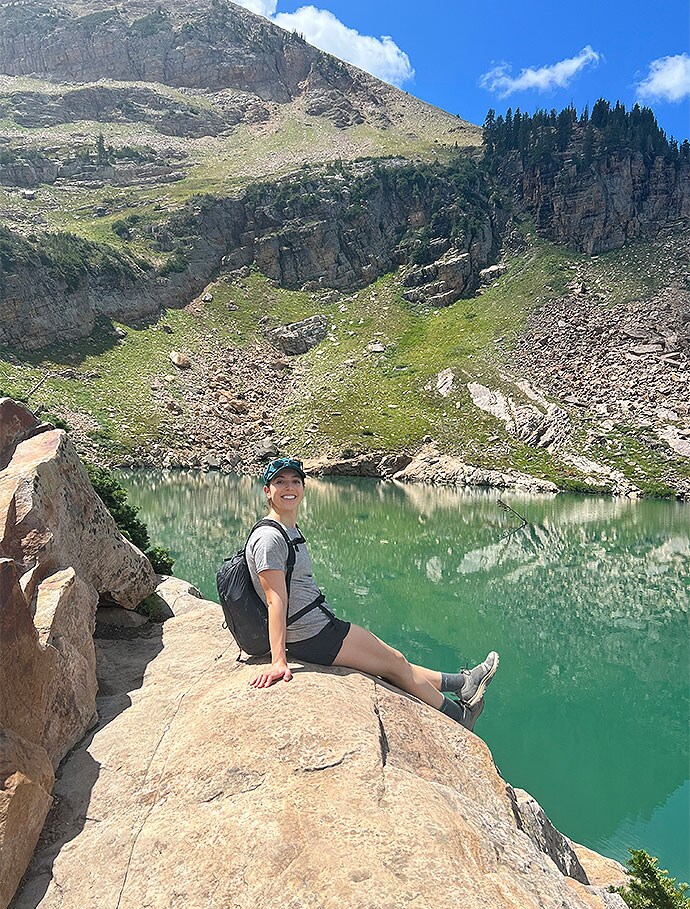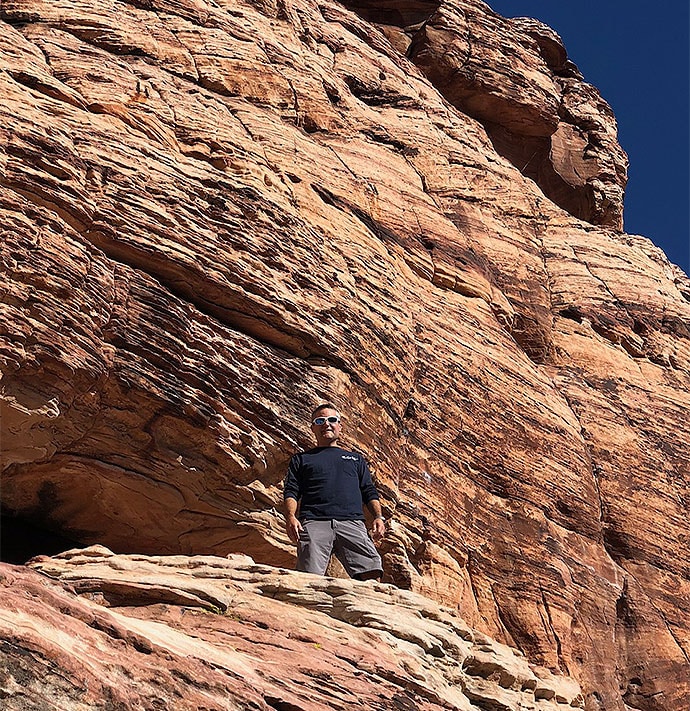When Lauren Levy, MD, made a list of priorities while applying for residency, her number one item was "climb more mountains."
That's not a metaphor. She meant it literally.

Dr Lauren Levy
When most physicians consider where they'd like to spend their residency ― and beyond ― at the top of the priority list are usually institution, research, and career opportunities. Everything else is secondary.
While this approach is traditional and logical, work-life balance can get lost in the shuffle. Some doctors, however, look at their potential match or placement through a different lens.
To Levy, 28, finding an institution where the culture matched her values was essential. "My program can last 6 to 8 years, a good amount of time during a formative period of my life," she explains. "I got a good sense of balance during med school and learned what made me happy. I didn't want to give that up during residency."
Levy is now a first-year resident at the University of Utah's integrated cardiothoracic surgery program ― and she admits that the pressure to match at a prestigious institution is inherent in the job. "At the end of the day, I want to be the best physician/surgeon I can be for my future patients," she says. "I think the pressure comes from that intrinsic drive to be that best."
Additionally, says Levy, when pursuing a career in academic medicine and research, the right residency with strong National Institutes of Health funding can tee up a post-residency career.
There are indications that Levy is part of a growing trend of physicians who are recalibrating work-life balance. A 2022 survey from the American Medical Association of more than 11,000 senior medical students revealed that roughly 3 out of 4 considered work-life balance to be one of the "most important factors" when ranking residency programs ― and that percentage has risen.
When Levy first visited Salt Lake City, the mountains took her breath away, and having proximity to them became a priority. "When my time is so limited, I think about how easily I can get out to recreate," she says. "I knew this location would encourage me to take advantage of what it has to offer and not fall into the habit of work, sleep, and eat. I'm hoping that after my residency, I can continue that."
Levy isn't the only one ― and this phenomenon isn't just for younger physicians.
"Happy Docs Make Happy Patients"
It's not unheard of for Sarah Sindell, MD, a 42-year-old general surgeon, to cross-country ski her way into work at Mammoth Hospital in Mammoth, California. She wouldn't have it any other way. "I like to hike, mountain bike, ski, and backpack," she says. "I've done these activities my whole life, so it was important that I could continue to do them wherever I landed a job."
Sindell decided on this priority at the time of her residency match, which led her to Virginia Mason Medical Center in Seattle. Following residency, she took her first job in Alaska at a large level II trauma center. Each location allowed her to continue with her favorite activities outside of work.
Sindell admits it can be easy to let those passions slide when neck deep in medical school and residency. "It's kind of built into our training that we seek out certain affiliations that provide prestige," she says. "It takes a conscious effort to look beyond that."
Having grown up in a small town in Maine, where outdoor activities were a part of life, Sindell says that she held those opportunities close throughout her training. "I do think that set me apart from my peers, but I felt strongly about it," she says. "My ultimate happiness would have been lower if I hadn't made this a priority."
Josh Emdur, DO, chief medical officer for SteadyMD, didn't realize living in a mountain town would be a priority for him until his third year in medical school. "I'm the son of a critical care pulmonologist, and I always thought that's what I'd want to do as well," he explains. "But I did a 1-month rotation in Big Sky, Montana, and that changed my perspective."

Dr Josh Emdur
Emdur is a passionate trail runner and skier, and he recognized having ready access to places where he could run and ski would be important for him following training. He pivoted to family medicine, which allowed him more flexibility in location. His future wife ― an ear, nose, and throat specialist ― had fewer options, owing to her specialty. Having completed his undergraduate work at the University of Colorado in Boulder, Emdur and his fiancée decided the mid-sized city served all their wants and needs. "I love being able to hop in the car and go skiing and being in a community of like-minded people," he says.
The result, Emdur believes, is being a better doctor. "To be an effective physician, you have to be in an emotionally good space," he points out. "Happy docs make happy patients. Being able to access my passions in life gives me a needed semblance of balance."
Putting Family First
There are many ways to measure work-life balance. Having time for family was one of the priorities that led Bradley Serwer, MD, an interventional cardiologist and the father of seven, to join CardioSolution. The company serves rural hospitals with two interventional cardiologists who alternate weeks. During an "on" week, Serwer is on call 24/7. On "off" weeks, however, he is entirely free of work obligations.

Dr Bradley Serwer
In Serwer's case, this unusual schedule has allowed him time to be involved in his kids' activities, to reach underserved communities, and to pursue his outdoor passions for skiing, boating, hiking, and more. Since Serwer's family lives in Bethesda, Maryland, he drives 4 hours to rural Honesdale, Pennsylvania, in the Pocono Mountains for his "on" weeks. "This works well for me," he says. "When I'm home, I'm there to help drive kids to practices, have meals with them, and generally catch more family time than I would otherwise. Then when I'm on, I'm on."
Serwer is also free during breaks on the job to drive down the road and ski, hike, or spend time on a lake. He has enjoyed the arrangement so much that he purchased a small house in the area. "In the summer when the kids aren't in school, we've taken advantage of that to recreate in the region," he says.
Family priorities also played into Emdur's ultimate decision to pursue a career in digital health. "Working in digital health has absolutely allowed me to have more time with my family," he says. "My hospital job required me to work every other weekend and every other holiday. Digital health has provided me with a lot more flexibility in my work, as I am not anchored to being in a clinic or hospital to treat patients."
Likewise, Sindell, says that her job in Mammoth, California, gives her the chance to spend more time with her spouse and two children. "I picked this location for what I can do outside of work," she says.
Can Location Prevent Burnout?
Finding a better work-life balance can have another bonus: avoiding burnout. Sindell explains that her choice to prioritize interests outside of medicine brings her both personal joy and professional stamina. "I can do this indefinitely," she says, "feeding my non-work needs while still staying fresh for work."
Levy understood the challenges she would face, as her chosen specialty leads to particularly high levels of burnout. Upwards of half the cardiothoracic surgeon population suffer from it, according to a 2019 survey. "It's a really tough field, and I knew that coming into it," she says. "I worked hard for what I could control ― how to live my life and set up my training environment."
Serwer also believes that his current position was the best choice to help keep him feeling fresh. "Living near [Washington] DC, I'd be covering two to three hospitals and spending several hours in the car every day driving between them," he points out. "I'd be gone for most of my daily hours. This is a better arrangement."
The nature of the medical profession, whether in clinical practice or academia, is to aim high, which makes it easy to forget about life outside of work. But for some physicians, personal happiness matters just as much as professional success and is worth protecting ― and they're learning that this isn't impossible.
"I knew I wanted to preserve the happiness I created for myself," Levy says. "I have job fulfillment, but I also get to do the things that make me happy and a better human. When I'm happy, I'm more productive and do a better job."
For more news, follow Medscape on Facebook, Twitter, Instagram, and YouTube.
Credits:
Lead image: Photodisc/Getty Images
Image 1: Dr Josh Emdur
Image 2: Dr Bradley Serwer
Medscape Medical News © 2023
Cite this: Why These Doctors Trade Prestige for Happiness - Medscape - Apr 18, 2023.












Comments